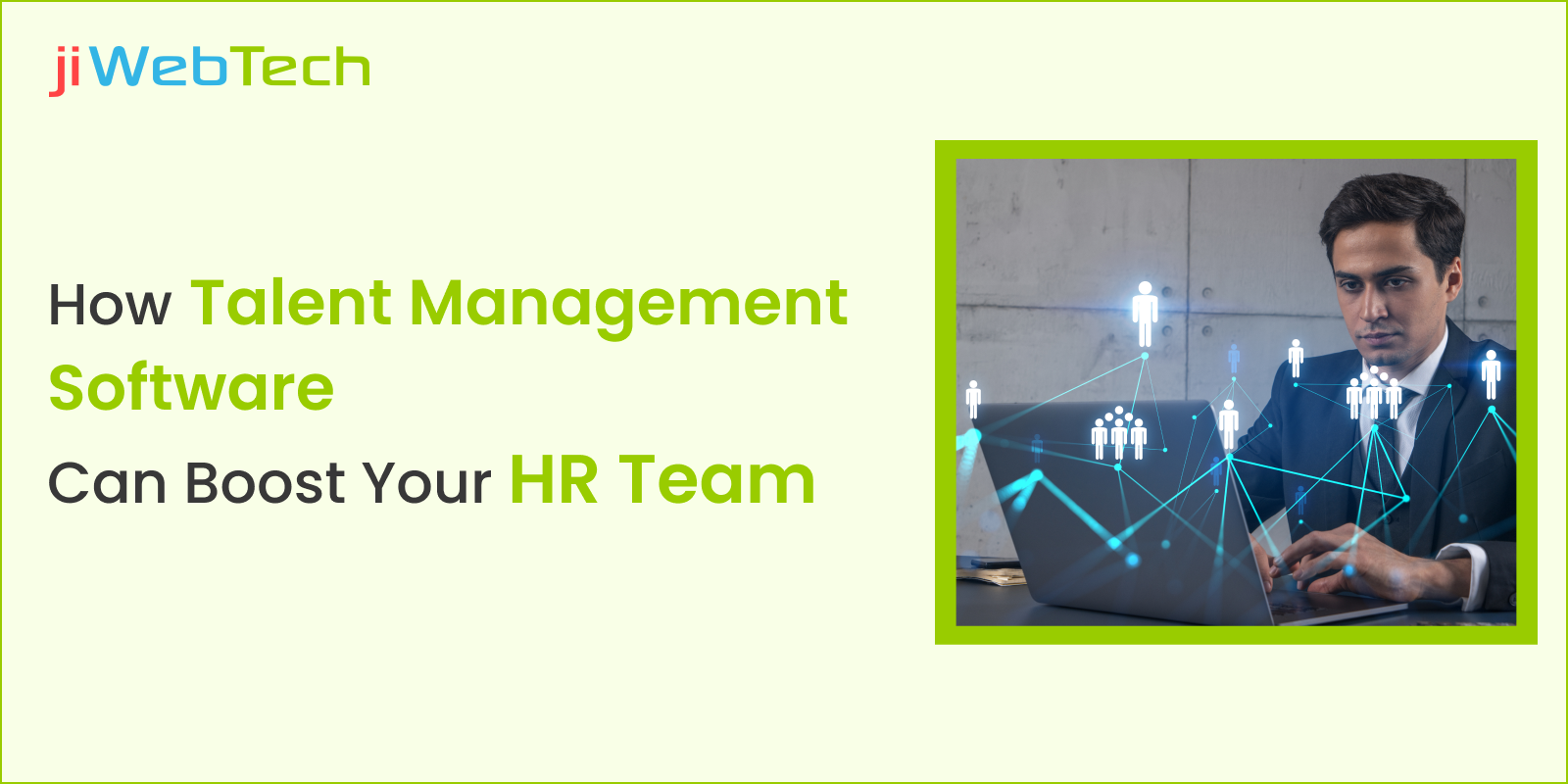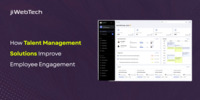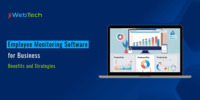- Apr 30, 2024
- Talent Management
- 3226
Share this post on:

In today's dynamic and competitive business landscape, human resources (HR) management plays a pivotal role in driving organizational success. With the advent of technology, HR functions have evolved significantly, and one of the most impactful advancements is the integration of talent management software. This innovative tool empowers HR professionals to streamline various processes, enhance recruitment efficiency, and optimize talent development strategies.
In this blog, we will delve into the multifaceted benefits of talent management software and explore how it can revolutionize your HR team's operations.
Key Features of Talent Management Software

At the heart of every successful organization lies a talented workforce, and recruiting the right people is crucial to achieving business objectives. Talent management software revolutionizes the recruitment process by leveraging advanced technology to automate and streamline various tasks.
In today's hyper-competitive business landscape, attracting, retaining, and developing top talent is essential for organizational success. To effectively manage these critical HR functions, many companies are turning to talent management software. This innovative technology offers a comprehensive solution to streamline recruitment, enhance employee development, and optimize workforce management strategies. In this blog, we'll explore the essential features of talent management software and how they empower organizations to maximize the potential of their human capital.
1. Applicant Tracking System (ATS)
An Applicant Tracking System (ATS) is a cornerstone feature of talent management software. It enables HR professionals to manage the entire recruitment process, from posting job openings to onboarding new hires. Key functionalities of an ATS include:
-
Job Posting and Candidate Sourcing: ATS allows recruiters to post job openings on multiple job boards and social media platforms, as well as search resume databases to identify potential candidates.
-
Resume Screening and Parsing: ATS automates the process of resume screening by parsing resumes and identifying top candidates based on predefined criteria, saving time and effort for HR teams.
-
Candidate Communication: ATS facilitates communication with candidates by sending automated emails, scheduling interviews, and providing status updates on their applications.
2. Performance Management
Effective performance management is crucial for driving employee engagement, productivity, and retention. Talent management software offers robust performance management features, including:
-
Goal Setting and Tracking: HR professionals can set individual and team goals aligned with organizational objectives and track progress over time, ensuring clarity and accountability.
-
Continuous Feedback: Talent management software enables managers to provide regular feedback and coaching to employees, fostering a culture of continuous improvement and development.
-
Performance Reviews: Automated performance review workflows streamline the review process, making it easier for managers to conduct timely and meaningful evaluations and identify areas for improvement.
3. Learning and Development
Employee development is a key factor in attracting and retaining top talent. Talent management software facilitates learning and development initiatives through:
-
Learning Management System (LMS): An integrated LMS allows HR teams to create and deliver training courses, track employee participation and progress, and assess learning outcomes.
-
Personalized Learning Paths: Talent management software enables HR professionals to create personalized learning paths tailored to each employee's skills, interests, and career goals, ensuring targeted development opportunities.
-
Skills Management: HR teams can identify skills gaps within the organization and develop targeted training programs to address them, helping employees acquire the skills they need to succeed.
4. Succession Planning
Succession planning is essential for ensuring continuity and stability within an organization. Talent management software facilitates succession planning by:
-
Identifying High-Potential Employees: HR professionals can use talent management software to identify high-potential employees based on performance, skills, and career aspirations.
-
Creating Talent Pools: Talent management software allows HR teams to create talent pools of high-potential employees and develop succession plans for key roles, ensuring a pipeline of qualified candidates for future leadership positions.
-
Tracking Progression and Development: HR professionals can track the progression and development of high-potential employees over time, providing targeted development opportunities to prepare them for future leadership roles.
Unleashing the Power of Talent Management Software: Benefits for HR Teams

In the digital age, where talent is a key driver of organizational success, HR teams face the daunting task of attracting, retaining, and developing top talent. To navigate these challenges effectively, many HR departments are turning to talent management software. This innovative technology offers a wealth of benefits that empower HR professionals to streamline processes, optimize workflows, and elevate their strategic impact within their organizations. In this blog, we'll explore the myriad benefits of talent management software on HR teams and how it transforms the way they manage human capital.
1. Streamlined Recruitment Processes
Recruiting the right talent is a critical function of HR, and talent management software streamlines every aspect of the recruitment process. From job posting to candidate onboarding, this software automates repetitive tasks, reduces manual errors, and accelerates time-to-hire. Key benefits include:
-
Automated Applicant Tracking: Talent management software includes robust applicant tracking systems (ATS) that automate resume screening, track candidate progress, and facilitate seamless communication.
-
Enhanced Candidate Experience: With personalized communication, streamlined scheduling, and timely feedback, talent management software enhances the candidate experience, strengthening the employer brand and attracting top talent.
-
Data-Driven Decision Making: By leveraging analytics and insights, HR teams can make data-driven hiring decisions, improving the quality of hires and reducing turnover rates.
2. Optimized Employee Development:
Employee development is essential for fostering engagement, retention, and performance. Talent management software offers a range of features to facilitate personalized learning and development initiatives, including:
-
Personalized Learning Paths: HR professionals can create tailored learning paths for employees based on their skills, interests, and career goals, ensuring targeted development opportunities.
-
Continuous Feedback and Coaching: With built-in performance management tools, managers can provide regular feedback and coaching to employees, driving continuous improvement and growth.
-
Skills Management: Talent management software enables HR teams to identify skills gaps, develop targeted training programs, and track employee progress, ensuring a skilled and adaptable workforce.
3. Efficient Performance Management:
Effective performance management is crucial for aligning employee goals with organizational objectives and driving performance excellence. Talent management software facilitates streamlined performance management processes, including:
-
Goal Setting and Tracking: HR teams can set SMART (Specific, Measurable, Achievable, Relevant, Time-bound) goals for employees, track progress, and provide timely feedback to ensure accountability and alignment.
-
Automated Performance Reviews: By automating performance review workflows, talent management software simplifies the review process, reduces administrative burden, and ensures consistency and fairness.
-
360-Degree Feedback: Talent management software enables multi-rater feedback processes, allowing employees to receive input from peers, managers, and direct reports, fostering a culture of transparency and collaboration.
4. Enhanced Strategic Insights:
Talent management software provides HR teams with valuable insights and analytics that enable them to make informed decisions and drive strategic initiatives. Key benefits include:
-
Data Analytics: By leveraging data analytics, HR teams can identify trends, predict future talent needs, and optimize workforce planning strategies, ensuring the right people are in the right roles at the right time.
-
Strategic Talent Planning: Talent management software enables HR professionals to develop comprehensive talent acquisition and retention strategies aligned with organizational goals, driving long-term success and competitive advantage.
-
Compliance Management: With built-in compliance features, talent management software helps HR teams ensure adherence to regulatory requirements and mitigate legal risks, safeguarding the organization's reputation and integrity.

Conclusion:
In conclusion, talent management software has the power to revolutionize the way HR teams operate, from streamlining recruitment processes to optimizing employee development initiatives. By leveraging advanced technology and data analytics, talent management software developed by a mobile app development company enables HR professionals to work more efficiently, make more informed decisions, and ultimately, drive organizational success. As businesses continue to navigate the complexities of the modern workforce, talent management software will undoubtedly remain a vital tool in their arsenal, helping them to attract, retain, and develop the talent they need to thrive in an increasingly competitive landscape.
If you are looking for a Talent Management Solution to streamline your HR processes, look no further than jiWebTech. We offer solutions that help your business grow to a greater level. Contact us to learn more.









